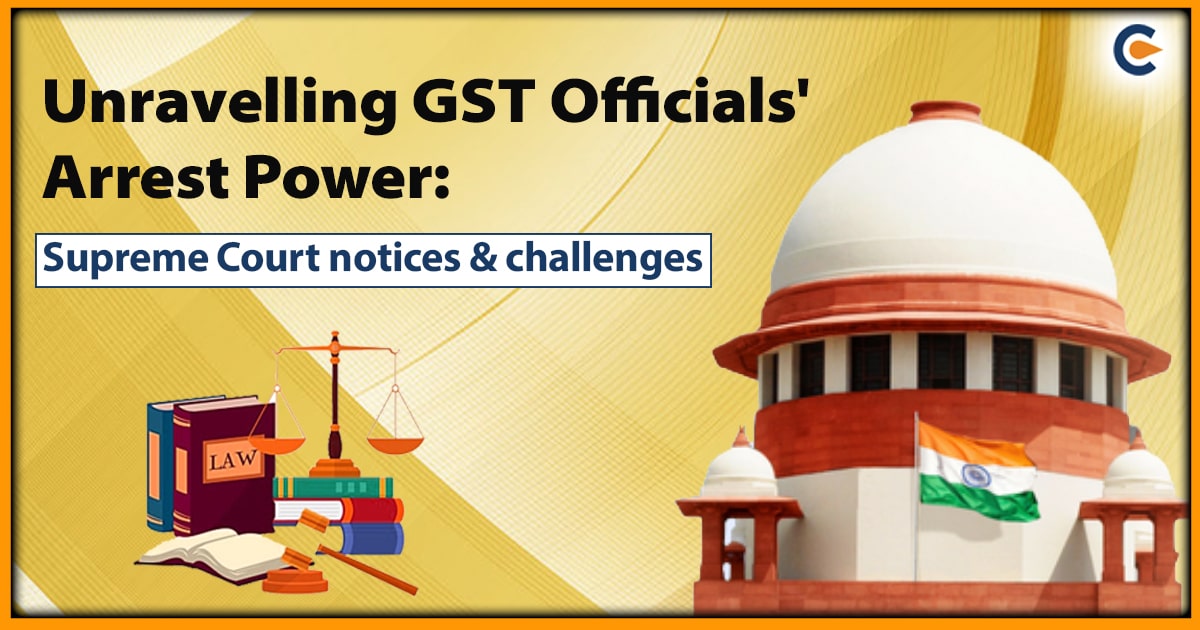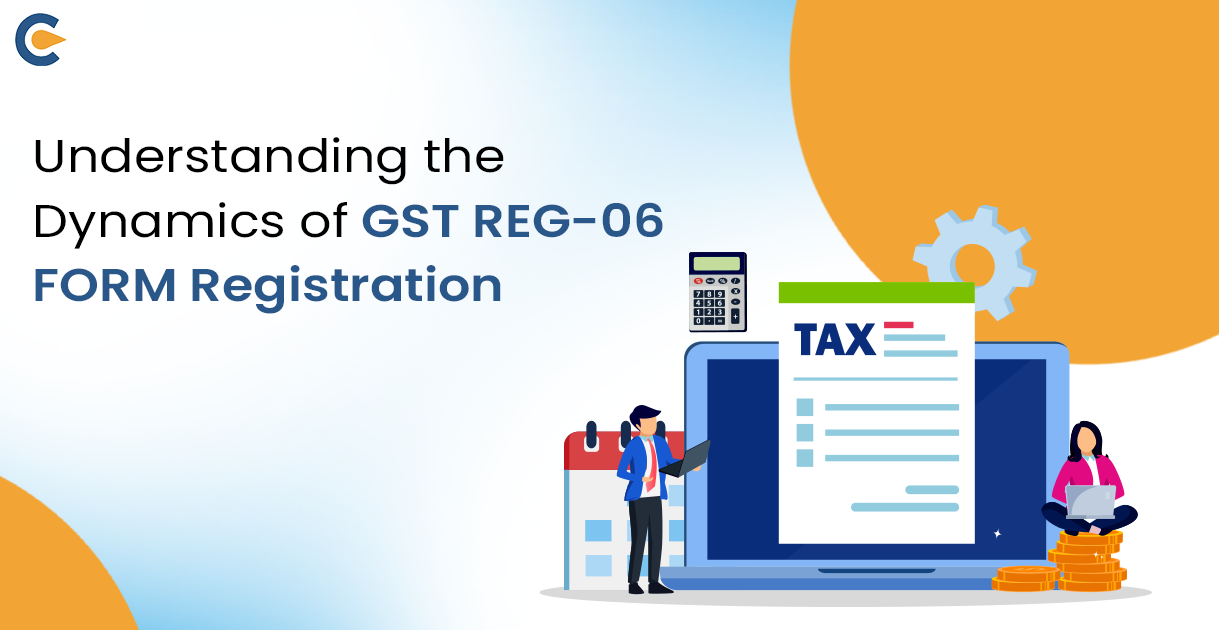The administration of taxes in India includes laws such as Inspection, Search, Seizure, and Arrest in order to defend the interests of genuine taxpayers and differentiate them from tax evaders, who have the potential to gain an unfair advantage over genuine taxpayers. This is done through determining genuine taxpayers from tax evaders. Tax evasion can be avoided thanks to provisions like these, which serve as a deterrent. These provisions are necessary in order to protect the legal dues owed to the government.
In order to safeguard the government’s revenue, the authorities reserve the right to inspect, search, seize, and arrest individuals, but they do so only in extraordinary situations and as a last resort. Therefore, in order to ensure that these provisions are used correctly and effectively and that the rights of taxpayers are also protected, the CGST Act stipulates that Inspection, Search, or Seizure can only be carried out when an officer of the rank of Joint Commissioner or above has reasons to believe that such exceptional circumstances exist. This is to ensure that these provisions are used correctly and effectively and that taxpayers’ rights are also protected. When it comes to arrests, on the other hand, this procedure can only be carried out if the individual being arrested is suspected of committing certain crimes that are designed for this purpose and the tax amount at issue is greater than a certain maximum.
The author of this article has provided a comprehensive analysis of the notice that was issued by the Supreme Court about the pleas that challenge the powers that GST officials have under Section 69 and Section 70(1). In addition to that, each of the sections of this article is discussed in detail, along with pertinent case laws.
GST authorities’ power of arrest & summon under the CGST Act: Explanation
The provisions for arrests that are incorporated in the CGST Act have adequate protections built into them to guarantee that these provisions are only utilised after receiving authorisation from the Commissioner. In addition to this, the CGST Act provides that arrests can only be conducted in those circumstances where the person is involved in offences that are defined for the purposes of arrest and the tax amount that is involved in such offences is more than the prescribed maximum. In other words, arrests can only be made if the person is in violation of offences that are specified for the purposes of arrest.
It is indisputable that those in charge of the GST have the authority to place an assessee under arrest; nevertheless, placing someone under arrest even before the tax has been calculated is not only entirely unjustified but also illegal. In the case of Akhil Krishan Maggu v. DGGI, the High Court of Punjab and Haryana ruled that authorities cannot initiate an arrest only on the allegation of evading service tax or failing to deposit service tax that has been collected without first investigating the matter. This ruling was made in the context of the case.
An explanation of Section 69 of CGST Act
If there is “reason to believe” that a person has committed tax evasion, the authorities have the power under Section 69 of the Central Goods and Service Tax (CGST) Act to arrest that individual. This provision grants the authorities this authority. If the Commissioner of GST has reasonable grounds for suspecting that a person has committed an offence under Section 132, that person may be placed under arrest by any authorised GST officer.
Powers as discussed under Section 69 CGST:
- The Commissioner may, by order, authorise the arrest of a person if they have substantial grounds to think the person has committed an offence in violation of Section 132(1) (a) to (d) of the CGST Act. This provision allows the Commissioner to sanction the arrest of a person.
- After that, the officer who is authorised to make the arrest is required to inform the person of the reasons for the arrest and produce them in front of a Magistrate within twenty-four hours. • After that, the Magistrate will either admit the person to bail or take them into custody.
- In the case of a non-cognizable and bailable offence, a Deputy or Assistant Commissioner, who has the same authority as an officer-in-charge of a police station, is able to release a person on bail. This is because they have access to the same information as the officer in charge.
Offences under Section 132
The following are the offences under section 132 for which arrest provisions are applicable:
- A taxable person supplies any goods or services without any invoice or issues a fake invoice.
- He issues any invoice or bill without supply of goods or services in breach of the rules of the Goods and Services Tax.
- He is responsible for any GST that is collected, but he does not remit it to the government within three months.
- Even if he collects any GST in violation of the requirements, he is still required to deposit it to the government within the allotted time frame of three months. Under the GST, failure to do so will constitute an offence.
- He was previously found guilty of an offence under Section 132 and sentenced accordingly.
Judicial precedents highlighting the scope of arrest under the CGST Act:
Different High Courts have adopted contradictory views on this issue. Let us discuss them in detail!
In the case of P.V. Ramana Reddy v. Union of India, the Telangana High Court had maintained the Commissioner’s right to order an arrest in the event that a cognizable and non-bailable offence had been committed. The court determined that there was no requirement for the filing of a First Information Report and ruled that the taxpayer was not eligible for pre-arrest bail. On the other hand, the Bombay High Court ruled in the case of Sapna Jain v. Union of India that no coercive action should be taken against the taxpayer and no arrests should be made.
In the recent case of Yogesh Jagdish Kanodia v. The State of Maharashtra, the Bombay High Court addressed the question of whether or not the arrest of an individual is permissible according to Sections 132 and 69 of the CGST Act. In this case,the input tax credit wrongly availed of by the petitioner exceeded INR 500 lakh, and the offence was punishable with imprisonment for a term; it was a cognizable and non-bailable offence under Sub-section (5) of the same Section. The petitioner in this case was arrested and produced before the Additional Chief Metropolitan Magistrate as a result of the commission of an offence under Section 132 (1) (b) (c) of the CGST Act. The High Court decided that such violations had been committed, which warranted an arrest, and it denied the petitioner’s request for bail. As a result, the petitioner was arrested.
In a similar vein, the arrest provision for tax evasion that was included in the CGST Act was recently upheld by the Delhi High Court. In this particular case, the Court emphasised that whenever any individual is arrested under the CGST Act, the said person is required to be told of the grounds of arrest and must necessarily be produced before a Magistrate within a period of twenty-four hours after their detention. In addition, the Court emphasised that this information must be provided in writing. This guarantees that the judiciary will keep an eye on the activities of the executive branch, and it cannot be construed as being inappropriate or excessive.
An explanation of Section 70 of CGST Act
A person is said to be “summoned” when they are called upon or compelled to appear in court. The power of the officer to require any person to appear before them to produce evidence in the form of papers pertaining to any specific topic is outlined in detail in Section 70 of the CGST Act 2017, which is the legislation that was passed in 2017.
Section 70(1): An officer appointed under this Act shall have the power to summon any person whose attendance he considers necessary either to give evidence or to produce a document or any other thing in any inquiry in the same manner, as provided in the case of a civil court under the provisions of the Code of Civil Procedure of 1908
2022 Circulars and instructions on the summons under CGST Act
The instructions provided by the Central Board of Indirect Taxes and Customs (CBIC) concerning the issuance of summons demonstrate adherence to Circular No. 122/41/2019-GST, which was dated 5thNovember 2019.
The instructions read as follows:
- Superintendents are authorised to issue summons only upon getting approval from the officer, as stipulated by prior written permission. In this particular scenario, it is imperative that the official in question possesses a rank no lower than that of Deputy or Assistant Commissioner. Furthermore, it is essential to maintain written documentation elucidating the rationale behind the issuance of the summons.
- In cases where it is not feasible to receive previous written permission, alternative methods such as telephonic or oral consent may be sought and afterwards documented in written form. It is imperative that this information be promptly and unequivocally communicated to the relevant officer.
- The user’s text does not contain any information to rewrite in an academic manner. The GST officer responsible for issuing the summons is required to maintain a file documenting the recipient’s compliance or non-compliance with the summons. It is imperative to ensure the preservation of this file as an integral component of the records. Furthermore, ensuring that a duplicate of the aforementioned statement is duly filed and preserved in the official records is imperative.
- In order to facilitate the receiver’s understanding of their role in the legal proceedings, it is imperative that the summons issued include the full name of the offender or offenders. This information enables the recipient to discern whether they are being called as the accused, co-accused, or in the position of a witness. The omission of the name may be warranted in cases when its inclusion could potentially impede the progress of the investigative procedure.
Supreme Court’s notice on pleas challenging powers of GST officials
On Friday, August 25th2023, the Supreme Court bench compromises of Justices Sanjay Kishan Kaul and Sudhanshu Dhulia issued two notices in two of the writ petitions (Title: Gagandeep Singh v. Union of India[1], Gagan Kakkar v. Union of India[2]). The petitions were filed under Article 32 of the Constitution of India, challenging the constitutional validity of several provisions of the Central Goods and Services Tax Act, 2017 (CGST Act), including Section 69 (i.e., power to arrest), 70(1) (i.e., power to summon persons to give evidence and produce documents). The Court has further stayed any coercive steps against the petitioners.
As per the said petitions, Sections 69 and 70 of the CGST Act are unconstitutional as being provisions of a criminal nature; they could not have been enacted under Article 246A of the Constitution of India, 1950. The power to arrest and prosecute is not ancillary and incidental to the power to levy and collect goods and services tax.
Elucidating the same, petitioners submitted that Entry 93 of List 1 of the Seventh Schedule of the Constitution of India confers jurisdiction upon the Parliament to make criminal laws only concerning matters in List 1, not CGST. Therefore, Sections 69 and 70 of the CGST Act are beyond the legislative competence of the Parliament.
In the present petitions, an investigation was initiated by the office of Respondent No.2 concerning certain allegations of evasion/ non-payment of GST. Based on these circumstances, Petitioners have filed the present petitions, apprehending coercive action by the Respondents, and have sought quashing of the proceedings initiated and continued against the Petitioners under the CGST Act in an alleged non-cognizable offence without following the procedure established by law and prescribed under Chapter-XII of the CrPC (Criminal Procedure Code), more particularly in Sections 154 to 157 and Section 172 thereof.
Conclusion
Assume the amount involved in the GST-related infraction exceeds INR 2 crore, and tax officials have reason to assume that the individual in question is capable of tampering with evidence. In that situation, an arrest for the GST-related infraction can be made. Furthermore, senior management will not be summoned at this point of the proceedings. The Central Board of Indirect Taxes and Customs (CBIC) has issued new guidelines that clarify the conditions for bail, arrest, and summons in cases concerning the Goods and Services Tax (GST). An assessee may be detained under specific conditions, according to Section 69 of the CGST Act. However, arresting someone is a time-consuming process that should never be conducted without first determining the assessee’s genuine level of guilt. Section 70 gives you the authority to compel witnesses to appear and documents to be produced.
Frequently Asked Questions (FAQs)
A Commissioner or any person authorised by the Commissioner or the Board to carry out that function is authorised to issue summons under CGST, provided the commissioner has all the ‘reasons to believe.
If the commissioner has reasonable grounds to believe that a person has committed any of the offences specified in clauses (a), (b), (c), or (d) of sub-section 1 of section 132, which are punishable under clauses (i) or (ii) of subsection (1) or subsection (2) of the said section, he may authorise any officer of central tax to arrest such person by order.
An arrest in GST-related offences can be made only if the amount involved exceeds Rs 2 crore and tax officials have grounds to suspect that the individual in question can tamper with evidence. Furthermore, the top management will not be called in the first instance.
The summons that are issued under the Central Goods and Services Tax are deemed to be judicial proceedings with the meaning of the Indian Penal Code (IPC).
Section 70(1) of CGST Act says that, an officer appointed under this Act shall have the power to summon any person whose attendance he considers necessary either to give evidence or to produce a document or any other thing in any inquiry in the same manner, as provided in the case of a civil court under the provisions of the Code of Civil Procedure of 1908
The following are the offences under Section 132 for which arrest provisions are applicable: • A taxable person sells goods or services without issuing an invoice or issuing a forged invoice. • Person issues any invoice or bill that does not include the supply of goods or services in violation of the Goods and Services Tax guidelines. • He is responsible for any GST that is collected, but he does not remit it to the government within three months. • Even if he collects any GST in violation of the requirements, he is still required to deposit it to the government within the allotted time frame of three months. Under the GST, failure to do so will constitute an offence. • He was previously found guilty of an offence under section 132 and sentenced accordingly.
Powers as discussed under Section 69 CGST: • The Commissioner may, by order, authorise the arrest of a person if they have substantial grounds to think the person has committed an offence in violation of Section 132(1) (a) to (d) of the CGST Act. This provision allows the Commissioner to sanction the arrest of a person. • After that, the officer who is authorised to make the arrest is required to inform the person of the reasons for the arrest and produce them in front of a Magistrate within twenty-four hours. • After that, the Magistrate will either admit the person to bail or take them into custody. • In the case of a non-cognizable and bailable offence, a Deputy or Assistant Commissioner, who has the same authority as an officer-in-charge of a police station, is able to release a person on bail. This is because they have access to the same information as the officer in charge.
Read Our Article: Invoice Registration Portal Under GST: Explained













